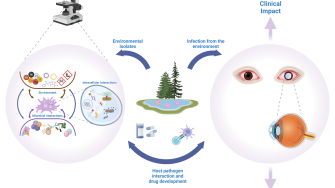Friday 17 February 2023
The importance of interdisciplinary research and cross-sector collaboration in microbiology
Prof Fiona Henriquez (University of the West of Scotland)
Prof Fiona Henriquez (University of the West of Scotland)

Abstract: As a microbiologist it is easy to be immersed in technical aspects of research, spending hours looking down a microscope, optimising experimental protocols, pouring over data analysis and ultimately focusing all efforts to an answer a specific research question. As the research environment changes, skills need to be developed to also ensure that basic science has impact in society, including policy, industry, and community. During my career so far, I have been on a journey to develop cross-sector collaborations and to identify pathways to impact for the prevention and treatment of Acanthamoeba keratitis. This has led to patents, industry collaborations, translating results obtained on the laboratory bench for the clinic and for industry and, vice versa, trying to understand industry needs and building research questions to address these. Herein, I will share my experience of this journey, including the challenges and rewards of cross sector collaboration, underpinned by the research into Acanthamoeba biochemistry to identify new anti-acanthamoebic targets.
Bio: Fiona gained her PhD in molecular parasitology, with the characterisation of dense granule proteins in the obligate parasite Toxoplasma gondii. She has continued in this area with a focus on host-pathogen interactions and parasite modulation of the host environment and immune response. Fascinated by toxoplasmosis in the eye, she began to work on the opportunistic pathogen, Acanthamoeba and the infection Acanthamoeba keratitis (AK). Her research focuses on the development of new treatments and prevention measures for AK, and understanding the host-pathogen interactions, focusing on innate immune cells. Currently, Fiona is leading a Natural Environment Research Council (NERC) and Department of Biotechnology in India funded project in collaboration with colleagues in the Indian Institute of Technology Bombay. Part of this project is investigating Acanthamoeba as a vector for bacteria and other infectious microbes, and their role in the emergence of antimicrobial resistance. This work contributes to the ‘One Health’ agenda and addresses several UN SDGs through interdisciplinary and cross-sector collaborators. She has gained experience and knowledge of the decision-making processes and communication channels in health economies, stakeholder mapping, drug development and environment disinfection.
Friday 17 February 2023
4:00-5:00pm
Rupert Myers Theatre / Zoom
https://unsw.zoom.us/j/83023210928?pwd=c2tBL2lsdFJMQldaTjNiT09DRVhTQT09